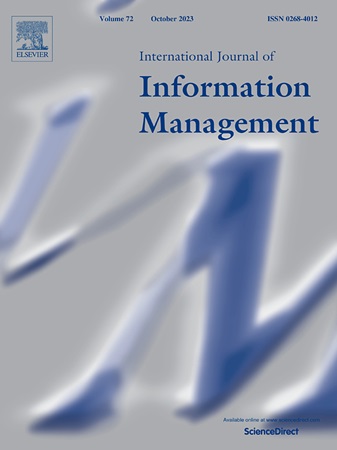Insights from the Job Demands–Resources Model: AI's dual impact on employees’ work and life well-being
IF 27
1区 管理学
Q1 INFORMATION SCIENCE & LIBRARY SCIENCE
International Journal of Information Management
Pub Date : 2025-02-22
DOI:10.1016/j.ijinfomgt.2025.102887
引用次数: 0
Abstract
Artificial intelligence (AI) has rapidly integrated into organizational workflows, sparking two debates: proponents argue that it increases productivity and decreases workloads, whereas opponents warn that it induces technostress (e.g., job replacement) and decreases employees' well-being. However, AI adoption by employees remains understudied, requiring both theoretical and empirical investigation to assess its positive and negative effects. This study employs the job demands–resources (JD–R) model as a guiding framework to examine the impact of AI demands (i.e., technostress) and resources (i.e., efficacy and generative AI) on employees' work and life domains (i.e., productivity, job satisfaction, and work–family conflict), with engagement and exhaustion as mediating factors. Data gathering through a three-wave survey involved 600 gender-balanced participants working with AI across diverse industries. Bayesian SEM results indicate that both AI efficacy and generative AI positively impact productivity, with AI efficacy also enhancing engagement and job satisfaction. In contrast, AI technostress increases exhaustion, exacerbates work–family conflict, and lowers job satisfaction, even though it may still contribute to productivity. These findings highlight the dual impact of AI on employees: AI technostress impairs well-being, while AI efficacy enhances it. Notably, generative AI mitigates the negative effects of technostress, a benefit not observed for AI efficacy as measured in this study. Overall, this study provides an empirical basis for understanding the resources and demands associated with AI adoption and its impact on employees' psychological processes, influencing both their work and life domains and leading to diverse outcomes.
工作需求-资源模型的洞察:人工智能对员工工作和生活幸福感的双重影响
人工智能(AI)已经迅速融入到组织工作流程中,引发了两种争论:支持者认为它提高了生产力,减少了工作量,而反对者则警告说,它会带来技术压力(例如,工作替代),并降低员工的幸福感。然而,员工对人工智能的采用仍未得到充分研究,需要理论和实证调查来评估其积极和消极影响。本研究以工作需求-资源(JD-R)模型为指导框架,考察人工智能需求(即技术压力)和资源(即效能和生成型人工智能)对员工工作和生活领域(即生产力、工作满意度和工作-家庭冲突)的影响,并以敬业度和疲惫度为中介因素。通过三波调查收集的数据涉及600名性别均衡的参与者,他们在不同行业与人工智能合作。贝叶斯扫描电镜结果表明,人工智能效能和生成式人工智能都对生产率产生积极影响,人工智能效能还能提高敬业度和工作满意度。相比之下,人工智能技术压力会增加疲劳,加剧工作与家庭的冲突,降低工作满意度,尽管它可能仍有助于提高生产力。这些发现强调了人工智能对员工的双重影响:人工智能技术压力会损害幸福感,而人工智能效率会增强幸福感。值得注意的是,生成式人工智能减轻了技术压力的负面影响,但在本研究中并未观察到人工智能效率的好处。总体而言,本研究为理解与人工智能采用相关的资源和需求及其对员工心理过程的影响提供了实证基础,影响了他们的工作和生活领域,并导致了不同的结果。
本文章由计算机程序翻译,如有差异,请以英文原文为准。
求助全文
约1分钟内获得全文
求助全文
来源期刊

International Journal of Information Management
INFORMATION SCIENCE & LIBRARY SCIENCE-
CiteScore
53.10
自引率
6.20%
发文量
111
审稿时长
24 days
期刊介绍:
The International Journal of Information Management (IJIM) is a distinguished, international, and peer-reviewed journal dedicated to providing its readers with top-notch analysis and discussions within the evolving field of information management. Key features of the journal include:
Comprehensive Coverage:
IJIM keeps readers informed with major papers, reports, and reviews.
Topical Relevance:
The journal remains current and relevant through Viewpoint articles and regular features like Research Notes, Case Studies, and a Reviews section, ensuring readers are updated on contemporary issues.
Focus on Quality:
IJIM prioritizes high-quality papers that address contemporary issues in information management.
 求助内容:
求助内容: 应助结果提醒方式:
应助结果提醒方式:


